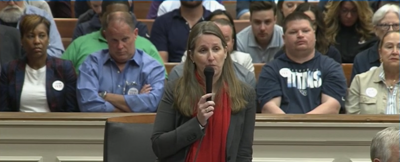The multipart intergovernmental deal for a new $2.1 billion Titans stadium has been in the red zone for months, weaving through legislative hurdles and dodging public criticism while the mayor’s office and team tries to cross two Ts and dot a single I. On Tuesday night, a public hearing will precede a third and final vote that could finally seal approval from the Metro Council.
Despite dozens of proposed amendments, the original deal, negotiated over the past 18 months by the Titans and Mayor John Cooper, survived largely intact. Last week, the council voted 25-11 in front of a packed gallery to approve the deal on second reading. Tonight’s hearing will split four hours equally between proponents, many organized by the team’s public relations partner Calvert Street Group, and critics, including public advocacy groups Stand Up Nashville and Nashville Organized for Action and Hope (NOAH).
Stadium financing will include $1.26 billion in tax subsidies from the city and state, a record-breaking chunk of public money — a top-line fact that has made the deal a flashpoint for conversations about city priorities. Economists are in rare agreement that, while popular among sports fans, stadiums do not return on public investment. Mayor Cooper, the team and The Tennessean are quick to point out that the new deal consigns multiple streams of tax revenue in and around the stadium to pay for its construction, rather than backing new stadium bonds with the city’s general fund, per the current Titans lease. In addition to public subsidies directly for the stadium, the city will pay an unknown sum, likely north of $1 billion over a decade, to prepare the East Bank with municipal infrastructure necessary for development.
Councilmember Bob Mendes, who vetted the deal with public hearings and engagement sessions in the fall as chair of the city’s East Bank Stadium Committee, remains one of the deal’s biggest critics. He shares his scrutiny with a vocal council minority that includes Freddie O’Connell, whom Mendes recently endorsed for mayor, Angie Henderson, a candidate for vice mayor, and Brandon Taylor, who attempted to claw back some stadium tax revenue for the city before his amendment was killed last week. Budget season in May and June would force the council to pause stadium debate, prompting tonight’s special meeting called specifically to give members a chance to finalize Titans details.
“We’re really concerned about the funding," Maura-Lee Albert tells the Scene on behalf of NOAH. "In no world do debts just get wiped away — they’re just bundled into a bigger deal. Eventually those bills will come due also. We only have so much money we can use as a city. We have lots of concerns about infrastructure, affordable housing, underfunded education. While other neighborhoods are falling apart, in desperate need of investment, we’re building more Gulch-like housing on the East Bank.”
The group, long focused on local issues like affordable housing and economic justice, hopes to turn out members who want to voice concerns about the deal at Tuesday's hearing. According to Albert, many are discouraged that the battle has already been lost, citing last week’s lopsided vote and a gallery packed hours early with Titans fans.
While negotiating with the city, the team worked with the Calvert Street Group, a public relations firm, to organize its campaign for a new stadium. Proponents and fans have showed up at public hearings to speak in favor of the stadium.
“The crowd in the room last Tuesday, and throughout the public meetings related to the stadium and East Bank, shows how passionate and engaged our community is about this project,” Titans spokesperson Kate Guerra tells the Scene in a written statement. “What we hear from supporters of the stadium is that they don’t want their property taxes obligated to an aging building, they’re excited for events that could come to Nashville with the new facility and the economic and cultural impact they bring, and they’re particularly excited about the idea of returning the stadium campus land to Metro to develop into a beautiful new neighborhood that’s estimated to generate over a billion dollars for our community’s greatest needs over the next 30 years.”
Residents disagree on whether this new neighborhood, which will function as a commercial base for stadium debt, will turn into a familiar downtown-adjacent tourist zone. For months, lawmakers have argued about the stadium's primary quantifiable benefit that could return on public investment: tax revenue in and around the site that could fill city coffers over the next three decades. The current deal signs away a significant portion of this revenue to back stadium debt, pay for repairs and cover maintenance costs.
"We have spent years in every marginalized and exploited community in Nashville and have heard firsthand what the people want the city to prioritize and make urgency around," Stand Up Nashville executive director Odessa Kelly tells the Scene. "Giving their hard-earned tax dollars to rich people was not one of them."
Like NOAH, Stand Up Nashville plans to coordinate testimony at tonight's hearing.





